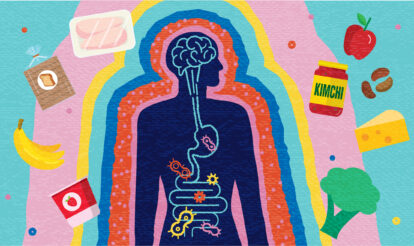
Should you take probiotics while on antibiotics?
Should you take probiotics while on antibiotics?

Should you take a probiotic alongside antibiotics?
In many cases, probiotics can support gut health during antibiotic treatment. However, effectiveness depends on the specific strains and formulation of a product, as not all probiotics can survive antibiotic exposure.
The impact of antibiotics on your gut health
While necessary for treating certain bacterial infections, antibiotics are non-selective, which means they inhibit both the pathogenic and the beneficial bacteria in the gut.
Just one course of antibiotics can reduce populations of beneficial species, potentially leading to digestive upset and nutritional imbalances. Repeated courses may further deplete healthy bacteria, slow recovery, and increase susceptibility to reinfection. Individual recovery varies depending on diet and overall health.[1]
While much of the gut microbiota recovers within about two weeks after a single course of antibiotics, this depends largely on the individual’s diet and overall health.[2] Repeated courses can significantly deplete healthy bacteria and prolong recovery time. This can increase susceptibility to reinfection as well as promote antibiotic resistance, potentially resulting in yet another course of antibiotics, which creates a vicious cycle.[3]
Why consider taking probiotics with antibiotics
Probiotic supplements can help maintain gut health during and after antibiotic use by supplying live beneficial bacteria to the intestines. Clinical studies have shown that probiotics can reduce the risk of antibiotic-associated diarrhea in both children and adults, and also reduce the loss of beneficial species.[4]
A 2022 systematic review of 29 studies found that taking probiotics alongside antibiotics reduced gastrointestinal side effects and helped maintain gut microbial diversity, supporting recovery of beneficial bacteria involved in immune defences and protecting against inflammation.[5]
These results are consistent with a meta-analysis that taking probiotics with antibiotics reduced C-difficile-associated diarrhoea in patients by 66%.[6]
Unfortunately, mainstream media have previously reported that probiotics provide little benefit during antibiotic treatment. These stories are more often based on a single study than a large systematic review, but they may cause confusion for consumers.
Can probiotics survive alongside antibiotics?
Yes – certain probiotic strains have been shown in clinical studies to withstand antibiotics and support the gut. These include:
Saccharomyces boulardi
- S. boulardii is a type of probiotic yeast, not a bacterium, which means it is not affected by antibiotics and effective in preventing and reducing diarrhoea caused by antibiotic treatment.
- A 2024 study found that S. boulardii was more effective than anti-diarrhoeals and/or oral rehydration therapy in controlling diarrhoea, even while taking antibiotics.[7]
- A 2023 study published in Frontiers in Medicine found that S. boulardii not only helped restore the gut microbiome after antibiotic treatment ended, but continuing supplementation for an additional seven days (17 days total) significantly contributed to microbial restoration.[8]
Bifidobacterium animalis ssp. lactis BB-12®
- BB-12® is a specific probiotic strain that is resistant to tetracycline antibiotics.[9]
- A 2024 study found that taking BB-12® alongside amoxicillin/clavulanate antibiotics prevented the loss of beneficial bacteria and helped maintain healthy levels of acetate, an important short-chain fatty acid.[10]
- BB-12 is also shown to improve intestinal immune function during antibiotics, potentially reducing the risk of infection and inflammatory conditions, as well as preventing diarrhoea by supporting the intestinal epithelial and immune cells.[11],[12]
Lactobacillus rhamnosus GG, reuteri, and acidophilus
- A 2025 study found that several Lactobacilli species, including Lactobacillus rhamnosus and L acidophilus are heteroresistant to antibiotics, meaning some cells can survive exposure.[13]
- L. reuteri may reduce antibiotic-associated diarrhea and improve outcomes in H. pylori eradication. Lactobacilli can help restore healthy gut bacteria after antibiotic courses.[14]
- Lactobacillus species are effective in treating dysbiosis caused by antibiotics and can restore healthy gut bacteria after the antibiotic course is completed.[15]
Can children take probiotics with antibiotics?
Yes, both Saccharomyces boulardi and Bifidobacterium animalis ssp. lactis BB-12® are considered safe for children and effective in reducing antibiotic-associated diarrhea and other digestive upsets.[16],[17]
Always check product instructions and consult a healthcare professional before giving probiotics to children.
How to take probiotics with antibiotics
Look for a probiotic product that is designed to be taken alongside antibiotics.
Some probiotics can be taken at the same time as antibiotics, and some may need to be taken at least two hours apart.
Take both probiotic and antibiotic consistently throughout the antibiotic course. Continuing the probiotic for at least one week after finishing antibiotics may support recovery. A high-potency, multi-strain formula can help restore the gut microbiome and immune system health after antibiotic treatment.
This information is provided for educational purposes only and is not a substitute for professional medical advice. Always seek the guidance of your physician or qualified healthcare provider with any questions you may have regarding your health or a medical condition.
References
[1] Dahiya D, Nigam PS. Antibiotic-Therapy-Induced Gut Dysbiosis Affecting Gut Microbiota-Brain Axis and Cognition: Restoration by Intake of Probiotics and Synbiotics. Int J Mol Sci. 2023 Feb 4;24(4):3074. doi: 10.3390/ijms24043074. PMID: 36834485; PMCID: PMC9959899.
[2] Ng KM, Aranda-Díaz A, Tropini C, Frankel MR, Van Treuren W, O’Loughlin CT, Merrill BD, Yu FB, Pruss KM, Oliveira RA, Higginbottom SK, Neff NF, Fischbach MA, Xavier KB, Sonnenburg JL, Huang KC. Recovery of the Gut Microbiota after Antibiotics Depends on Host Diet, Community Context, and Environmental Reservoirs. Cell Host Microbe. 2019 Nov 13;26(5):650-665.e4. doi: 10.1016/j.chom.2019.10.011. Erratum in: Cell Host Microbe. 2020 Oct 7;28(4):628. doi: 10.1016/j.chom.2020.09.001. PMID: 31726029; PMCID: PMC8276089.
[3] World Health Organization: WHO. (2023, November 21). Antimicrobial resistance. https://www.who.int/news-room/fact-sheets/detail/antimicrobial-resistance
[4] Rodgers B, Kirley K, Mounsey A. PURLs: prescribing an antibiotic? Pair it with probiotics. J Fam Pract. 2013 Mar;62(3):148-50. PMID: 23520586; PMCID: PMC3601687.
[5] Fernández-Alonso M, Aguirre Camorlinga A, Messiah SE, Marroquin E. Effect of adding probiotics to an antibiotic intervention on the human gut microbial diversity and composition: a systematic review. J Med Microbiol. 2022 Nov;71(11). doi: 10.1099/jmm.0.001625. PMID: 36382780.
[6] Johnston BC, Ma SS, Goldenberg JZ, Thorlund K, Vandvik PO, Loeb M, Guyatt GH. Probiotics for the prevention of Clostridium difficile-associated diarrhea: a systematic review and meta-analysis. Ann Intern Med. 2012 Dec 18;157(12):878-88. doi: 10.7326/0003-4819-157-12-201212180-00563. PMID: 23362517.
[7] Pal BB, Bandagi RV, Pebbili KK, Rathod R, Kotak B, Dhanaki G, Shah S. Effectiveness of Saccharomyces boulardii CNCM I-745 in Adult Indian Patients with Diarrhoea: A Real-world, Multicentre, Retrospective, Comparative Study. Drugs Real World Outcomes. 2024 Jun;11(2):309-316. doi: 10.1007/s40801-024-00424-3. Epub 2024 Apr 6. PMID: 38581564; PMCID: PMC11176121.
[8] Spatz M, Wang Y, Lapiere A, Da Costa G, Michaudel C, Danne C, Michel ML, Langella P, Sokol H, Richard ML. Saccharomyces boulardii CNCM I-745 supplementation during and after antibiotic treatment positively influences the bacterial gut microbiota. Front Med (Lausanne). 2023 Aug 4;10:1087715. doi: 10.3389/fmed.2023.1087715. PMID: 37601783; PMCID: PMC10436532.
[9] Amund OD, Ouoba LI, Sutherland JP, Ghoddusi HB. Assessing the effects of exposure to environmental stress on some functional properties of Bifidobacterium animalis ssp. lactis. Benef Microbes. 2014 Dec;5(4):461-9. doi: 10.3920/BM2013.0099. PMID: 25097108.
[10] Uttarwar RG, Mekonnen SA, Van Beeck W, Wang A, Finnegan P, Roberts RF, Merenstein D, Slupsky CM, Marco ML. Effects of Bifidobacterium animalis subsp. lactis BB-12 and yogurt on mice during oral antibiotic administration. Microbiol Res. 2024 Sep;286:127794. doi: 10.1016/j.micres.2024.127794. Epub 2024 May 31. PMID: 38852301.
[11] Bozkurt HS, Quigley EM. The probiotic Bifidobacterium in the management of Coronavirus: A theoretical basis. International Journal of Immunopathology and Pharmacology. 2020;34. doi:10.1177/2058738420961304
[12] Blaabjerg S, Artzi DM, Aabenhus R. Probiotics for the Prevention of Antibiotic-Associated Diarrhea in Outpatients-A Systematic Review and Meta-Analysis. Antibiotics (Basel). 2017 Oct 12;6(4):21. doi: 10.3390/antibiotics6040021. PMID: 29023420; PMCID: PMC5745464.
[13] Rivera-Rodriguez DE, Busby C, Cervantes-Barragan L, Weiss DS. Widespread heteroresistance to antibiotics in Lactobacillus species. bioRxiv [Preprint]. 2025 Mar 24:2025.03.24.644958. doi: 10.1101/2025.03.24.644958. PMID: 40196655; PMCID: PMC11974758.
[14] Liang B, Yuan Y, Peng XJ, Liu XL, Hu XK, Xing DM. Current and future perspectives for Helicobacter pylori treatment and management: From antibiotics to probiotics. Front Cell Infect Microbiol. 2022 Nov 25;12:1042070. doi: 10.3389/fcimb.2022.1042070. PMID: 36506013; PMCID: PMC9732553.
[15] Shi Y, Luo J, Narbad A, Chen Q. Advances in Lactobacillus Restoration for β-Lactam Antibiotic-Induced Dysbiosis: A System Review in Intestinal Microbiota and Immune Homeostasis. Microorganisms. 2023 Jan 11;11(1):179. doi: 10.3390/microorganisms11010179. PMID: 36677471; PMCID: PMC9861108.
[16] Fu H, Li J, Xu X, Xia C, Pan Y. Effectiveness and Safety of Saccharomyces Boulardii for the Treatment of Acute Gastroenteritis in the Pediatric Population: A Systematic Review and Meta-Analysis of Randomized Controlled Trials. Comput Math Methods Med. 2022 Sep 20;2022:6234858. doi: 10.1155/2022/6234858. PMID: 36176742; PMCID: PMC9514928.
[17] Vizioli C, Jaime-Lara R, Daniel SG, Franks A, Diallo AF, Bittinger K, Tan TP, Merenstein DJ, Brooks B, Joseph PV, Maki KA. Administration of Bifidobacterium animalis subsp. lactis Strain BB-12 ® in Healthy Children: Characterization, Functional Composition, and Metabolism of the Gut Microbiome. medRxiv [Preprint]. 2023 Feb 6:2023.02.02.23285145. doi: 10.1101/2023.02.02.23285145. Update in: Front Microbiol. 2023 May 12;14:1165771. doi: 10.3389/fmicb.2023.1165771. PMID: 36798243; PMCID: PMC9934720.




